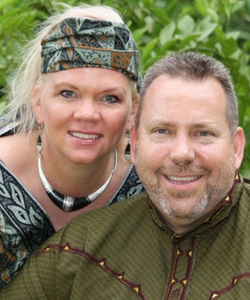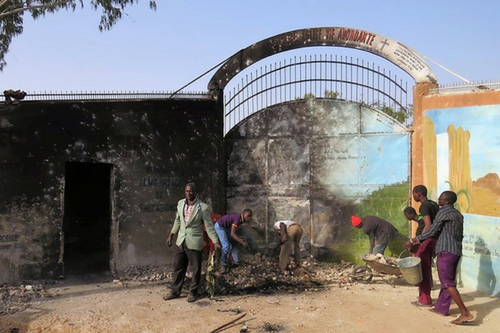‘Terrorism Cannot Stop the Gospel,’ Say Niger Missionaries Who Faced Violent Attack
Missionaries since 1998, Neal and Danette Childs recount a frightening terrorist attack in remote Niger. Yet how a few young African men reacted reveals the impact of the gospel.
In two decades as Christian missionaries in Niger, Africa, Neal and Danette Childs have faced a host of challenges. Critics have doubted their approach to ministry. Supporting funds and personnel have been slow to come at times. And violent attacks have forced them to rebuild.
While the remote nation regularly ranks as one of the world’s poorest, the Childs and their multi-national team are seeing their long-term efforts bear fruit. One large-scale terrorist incident particularly revealed to the missionaries how the Gospel has changed Niger.
“Terrorism cannot stop the Gospel,” says Neal Childs, who followed in his father’s footsteps as a missionary and now leads RUN International. “RUN” stands for “Reaching Unreached Nations.” “It’s definitely not something that would drive us away from serving in Niger. We’ve been able to build back better, and our faith has grown stronger.”
Faith Like a Child
Founded in 1992 by Ron and Jerry Childs, Vie Abondante (“Abundant Life”) is a ministry of diverse pastors and missionaries in Niger. Six years later, their son Neal and his wife Danette joined the work. “Our ministry is very focused on discipleship,” says Neal. “We started working alongside local leaders and planting churches.”

Danette and Neal Childs
Within a few years, the next-generation Childs were providing leadership to the network. They helped establish multiple Bible schools in Niger to train pastors. By 2018, Vie Abondante had grown from eight to 52 churches established across the nation over two decades. One reason for the growth, the Childs believe, is a unique ministry strategy that enables them to marshal resources and give children a hands-on faith experience.
“Where we have churches in villages, the Christians there are a minority,” explains Neal Childs. “They are few in number, always around a Muslim environment. Once a year, to create a strengthening of fellowship and community, all the children in our churches come together.” Pew Research Center reports the population of Niger as currently 98 percent Muslim.
Their annual children’s camps are usually held in two parts of Niger. In addition to Vie Abondante pastors and leaders, teams from the U.S. come prepared to perform Bible-based dramas, lead worship and encourage the children in their faith.
“These are young people who have made their choice to receive Christ and follow him,” continues Childs. “The children’s camps are discipleship-oriented rather than evangelistic. It has helped them to go back and continue to shine as a light wherever they’re at. After the camps, they know they’re not isolated or on their own.”
After 12 years of camps, the Niger missionaries are seeing a difference. “A lot of churches have sent short-term teams to help in these children’s camps,” says Danette. “They don’t get the benefit of seeing the long-term impact. It’s been so many years now, the kids who started as campers are now adults. They’re helping with the camp as team captains and counselors.”
It provides the backdrop for how they began to see societal change in the midst of crisis.
When Protests Inflamed Muslim-Majority Nations
Despite terrorist threats around Niger, the nation has been recognized for its stability.
“An official at the U.S. Embassy once told us: Niger is the good home in a bad neighborhood,” relates Neal. “You have Boko Haram out of Nigeria, coming in from the east. Libya has things going on, coming down from the north. In Mali, the rebels stir up conflict. Yet Niger has been strongly opposed to allowing terrorism to have any foothold.”

On January 11, 2015, nearly two million people including 40 world leaders gathered in Paris, France for a rally of national unity following the terrorist attack on Charlie Hebdo journalists.
Yet tensions flared in early 2015 after the French satirical paper Charlie Hebdo published an inflammatory cartoon of the Prophet Muhammad. The publication was viewed by many Muslims as sacrilege, leading some to violence. In Paris, al-Qaeda terrorists killed 12 newspaper employees and injured another 11.
Some Muslim leaders condemned the attack, stating Islam supports free speech rights. Yet extremist factions in Muslim-majority nations — including Niger — saw an opportunity to stir up conflict. A week after the attacks, more than 40 world leaders addressed a rally of nearly four million people in Paris. They honored the victims and extolled free speech rights.
“The Niger President had gone to Paris to stand in solidarity with the people that had been killed,” recalls Childs. “It is said that the Niger opposition party, who opposed the president, used that opportunity for political gain.” To exploit President Mahamadou Issoufou’s absence, his political opponents mobilized the criminal element with extreme Islamist rhetoric.
Terrorists Burned Churches
On January 17 and 18, 2015, terrorists in Niger attacked and burned 72 churches. Four of those churches were part of the Vie Abondante network. The Childs could not stop the arsonists from attacking several local churches in Niamey where they live. Then word reached them that their largest church, an eight-hour drive away in Maradi, was under siege.
Over 1,000 people were gathered at the gates of the Maradi ministry base. As young men in Maradi became violent during protests, law enforcement took a step back. Protesters saw an easy target in the city’s largest church.
It was not the first time the Maradi base had been attacked. Fifteen years earlier, a terrorist incident had left the church and local pastor’s home little more than rubble. “Because of the attack in 2000, we built that wall really high with spikes,” says Neal. “The base had a double-ply steel gate, with an I-10 beam across it. Yet without people there holding the gate on the inside, it could be compromised.”
The rebuilt Maradi base had become a hub for the annual children’s camps. “Our pastor who lives there and one of the local missionaries began to evacuate the church compound,” recalls Danette. “They got the pastor’s wife to safety, along with other women and children. But the youth that were there refused to leave.”
The Young Men Stood Firm
Fifteen young men stood firm at the gates of the church compound. Having seen them grow up from boyhood in the summer camps, Neal recounts their heroic actions. “They stayed there,” he recalls. “They said, We’re not leaving Pastor Hashimou. We’re jealous for the house of the Lord. If we die today, we’ll be in heaven.”
Those 15 Christian Nigerien men stood and physically held the gate closed as over 1,000 protesters attempted to enter the ministry base. “They couldn’t get in,” he says. “But they threw stones over the walls and broke all the glass windows in the compound. Finally, after four or five hours of the young men inside holding the gate, the police showed up and broke up the protest.”
The crisis averted, the Childs had the opportunity to relate what happened in the attack to friends in the U.S. Ultimately, some aspects of the story were broadcast on Fox News.
Bearing Fruit That Remains
Rebuilding of the four Vie Abondante churches soon began, as did repairs to the Maradi ministry base. “The next day, our guys gathered up all the stones that had been thrown into the compound,” recounts Neal. “They posted a picture on Facebook, standing in front of this huge pile of rocks. They stated: This is a tribute to the faithfulness of God.”
His wife eagerly joins in sharing details of the story. “To us, this was a tribute that there are disciples of Jesus in Niger,” says Danette. “We realized the impact of our work. As kids, they had all been discipled over the years through the children’s camps. Now as men in their late teens and early 20’s, they were ready to literally give their lives to save this church.”

On January 17, 2015, terrorists used fire and rocks in an attack on the Vie Abondante ministry base in Maradi, Niger. They were unable to breach the church compound due to several young African men inside who held the gates.
Three years later, Neal and Danette face a new chapter ahead. They have released leadership of Vie Abondante to a local Nigerien pastor, while remaining on the ministry board as support. Through R.U.N. International, they plan to branch out into other African nations as well as into Asia.
“We’ve been blessed to work as a team with several Nigerian and American missionary families,” says Danette. “It’s not just us. Through the years, all these church plants have been pastored by Nigerien nationals. The goal all along was that a Niger pastor would be at the helm of the Vie Abondante ministry.”
Next-Generation Minded
While continuing to support the work in Niger, the missionary couple plan to build on the work of the past two decades. “Now we’re freed up to go out to some other countries,” says Neal. “The experiences we’ve had in Niger and things we’ve learned, we will take those into similar settings. That’s what is in our hearts and where we’re headed.”
The Childs lament injuries, property damage and, most tragically, lives lost to persecution against believers. Yet they have also observed a strange paradox. “People always ask, Aren’t you afraid living in Africa — the snakes, the heat and terrorism?” Neal responds, “I’ve always said two things. First, churches have always grown after persecution.”
“And if there’s anything I would be afraid of in my time in Niger,” he continues, “it’s that after I’ve served and given my life for the gospel in this land, that the work wouldn’t continue were I to leave. What we’re doing is not just about this moment. We’ve always been next-generation minded.”
“Every time we plant a church, it’s so the Gospel will go forward into the future.”
Watch the video below and visit RUN International to learn more about the work of Neal and Danette Childs. Look for further stories with the Childs coming soon in The Stream.







